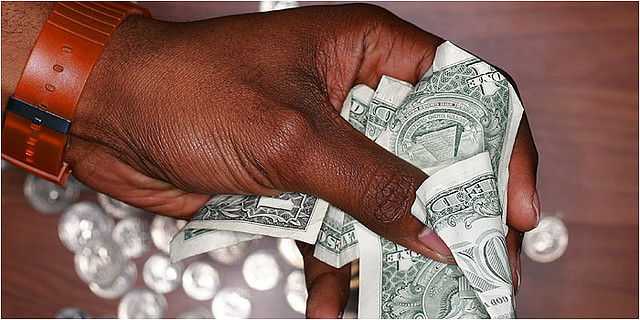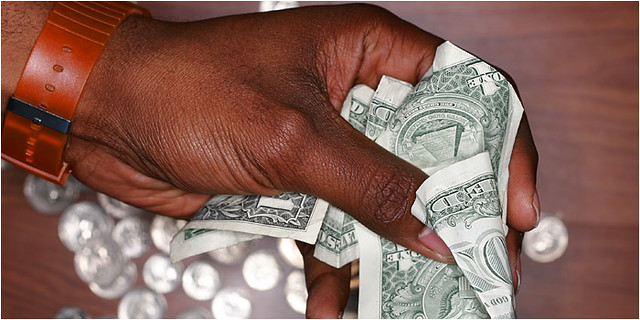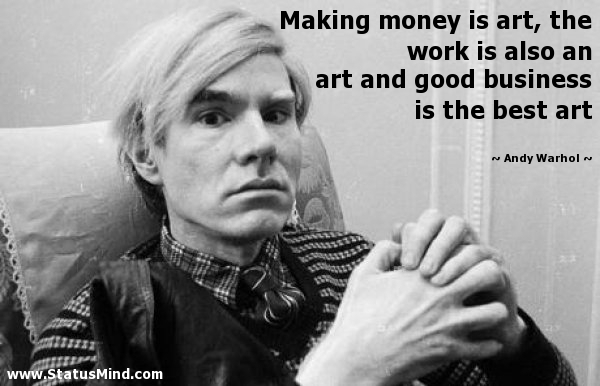photo: “Get Money” by Brandon King
From On the Psychology of Writing by Kiini Ibura Salaam.
The magic of artmaking doesn’t diminish the effort it takes to make a living from your work.
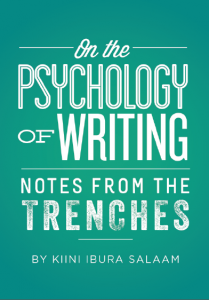 Money is emotionally charged for everyone, but for artists it is an incredible force that we attach so much meaning to. It’s a means of validation, it’s a barometer that determines whether you’ll continue creating work or not. Sometimes we have lashed money and success so tightly together that it’s hard to remember that one does not necessarily bring the other.
Money is emotionally charged for everyone, but for artists it is an incredible force that we attach so much meaning to. It’s a means of validation, it’s a barometer that determines whether you’ll continue creating work or not. Sometimes we have lashed money and success so tightly together that it’s hard to remember that one does not necessarily bring the other.
The crazy obvious secret is that making money as an artist is not magic. You don’t waft your creativity in the air and instantly become showered with gold doubloons. Earning money, like anything else is a process. Discovering that you are responsible not just for making work, but also for determining how the funds are going to flow into your life is a process. It’s a process that everyone—artist or not—has to discover for themselves. There will be trial and error. There will be more than one path you take and more than one technique required.
People who work a nine to five trade their time for money. When artists refuse to work a conventional job and decide they want to make a living from their art, they become responsible for tagging and codifying their work. They must dissect their output and place monetary value on each piece of productivity. They need to know exactly how many articles they need to write, paintings or poetry chapbooks they need to sell, performances you need to do per month to live off the proceeds your work. They need quantifiable goals for self-support and an actionable plan to go out and get it.
It’s easier to complain and I’m certainly not immune. Ironically, I complained the most in my earlier years as a writer. I’d whine about not making money from my work or jealously compared my merits against another writer who was “making it” financially. One day I a huge realization broke over me. Yes, I wanted money from my work, but where was the money going to come from? I had no product to exchange for money. I didn’t even have a published book. Strong ideas? Great. Fine writing? Wonderful. But power with money has never been born from complaining or comparing, but from building pathways for income to flow in.
If it’s true that most millionaires have approximately three failed businesses in their past, many of them have filed for bankruptcy at least once, and they all have multiple streams of passive income bulking up their bank accounts—then it follows that failure and multiplicity will feature on the artist’s money path as well.
What’s usually happening in the background when we artists complain about not making money from our art, we are collapsing making money and making art. We are caught in a false equation, believing that the quality of our work should correspond with the quantity of our income.
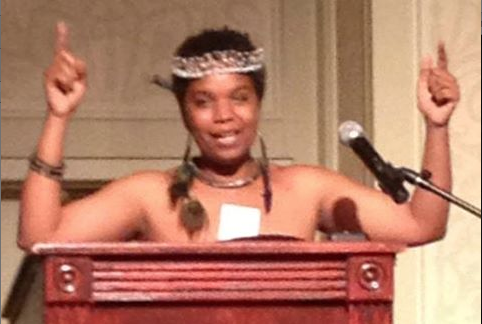
One of the bitter truths that we have to accept is that life is not a meritocracy—the most deserving do not necessarily get the spoils. If, as an artist, you want to make money from your work, you will have to be ruthlessly honest with yourself. Are you prepared to prioritize the hustle for money over your art? Are you willing to study the real-life examples of the artists who are surviving and accept the financial limitations, the physical requirements, and the necessary frequency of output? The best thing any of us can do for ourselves is understand our own criteria, accept our paths, and take responsibility for our choices.
Creating financial gain requires business acumen. Despite the amount of effort, focus, and hustle it takes for businesses to stay above water, many of them fail, and for those that succeed, it’s standard to take a minimum of five years to turn a significant profit. That’s five years of full-time skin in the game. For artists that means working at audience building for five years, taking out loans and spending savings while you develop five years worth of content, five years of tweaking your various pathways for income. Based on the fact that millionaires are standing on histories of bankruptcy and failed business, as well as multiple streams of passive income, it follows that failure and multiplicity will feature on the artist’s money path as well.

To make money as an artist, you might have to fail a few times. You might have to face bankruptcy. You might have to be hungry. None of that means that your work has no merit. It just means that the process of finding pathways for income can be rocky and steep. When all is said and done, artmaking is a highly personal, internal impulse. If you are an artist, artmaking will be a need, regardless of your income level. Whether or not you’re making money, the art has to be made. This is where I situate my place of power. I listen closely when I hear successful writers talk about the business. I pay attention to how often they travel to hock their books, and whether or not public speaking and teaching to supplementing their income. But then I get back to work. Because whether I’m making art for the money or for me, the art has to be made.
Kiini Ibura Salaam is a writer, painter, and traveler from New Orleans, Louisiana. Her short story collection Ancient, Ancient—winner of the 2012 James Tiptree, Jr. award—contains sensual tales of the fantastic, the dark, and the magical. Her Notes From the Trenches ebook series collects essays about the writing life. Her new collection When the World Wounds is forthcoming from Third Man Books in 2016. Her micro-essays on writing can be found at www.kiiniibura.com.

